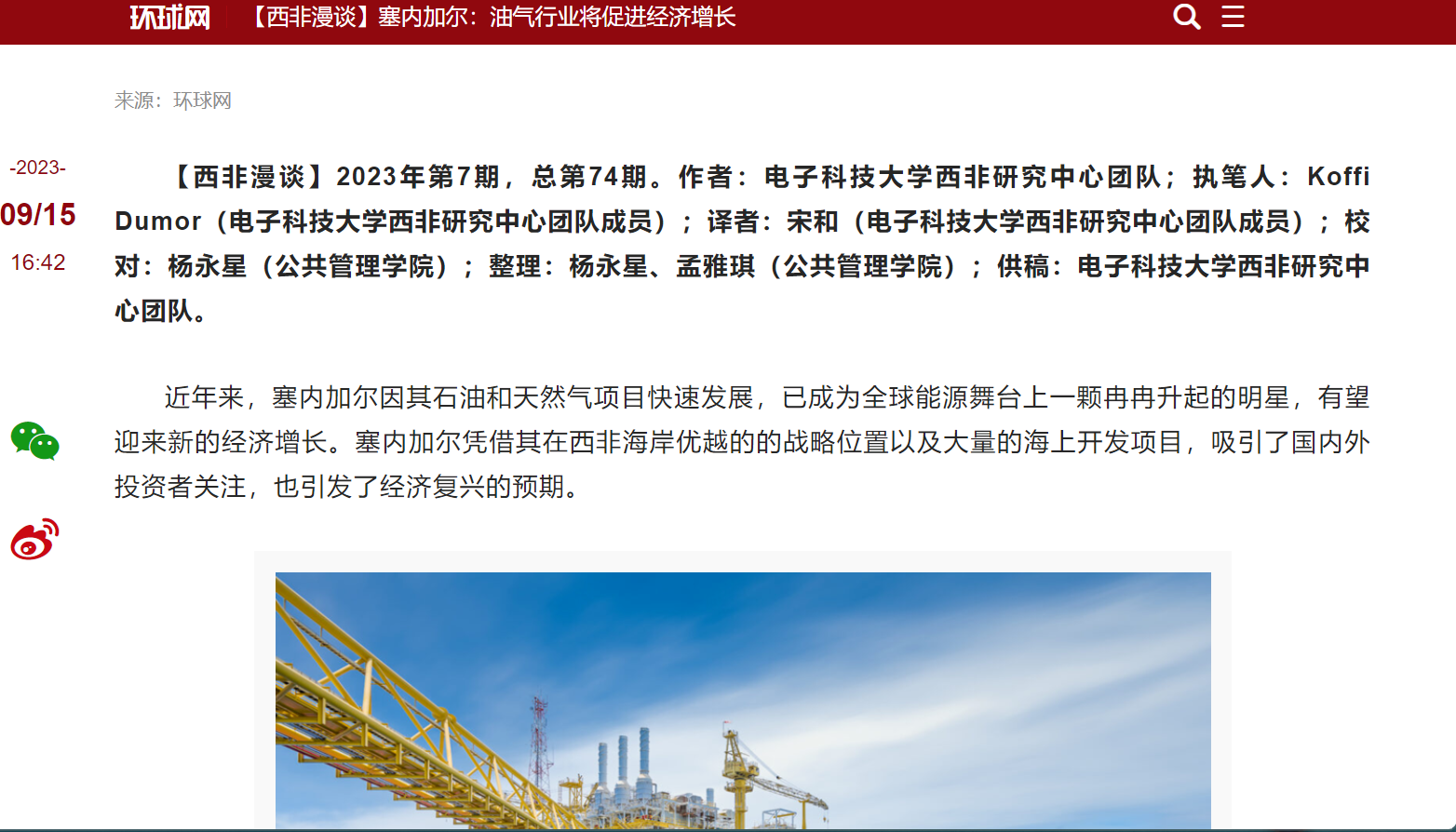
Link:https://opinion.huanqiu.com/article/4EYCcbBBJow
In recent years, Senegal has emerged as a promising player in the global energy arena, with its flourishing oil and gas projects poised to usher in an era of unprecedented economic growth. The nation's strategic location on the West African coast, coupled with substantial offshore discoveries, has attracted significant attention from both domestic and international investors, sparking anticipation of an economic renaissance.
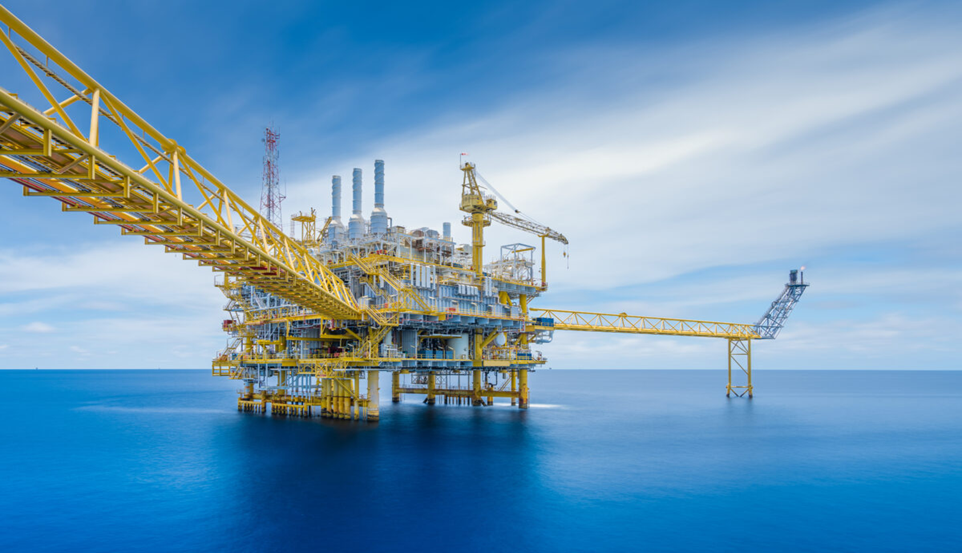
Source: https://african.business/2023/04/dossier/senegals-dynamic-economy-turbocharged-by-oil-and-gas-growth
Senegal's journey towards harnessing its hydrocarbon potential began with major offshore discoveries, which have now set the stage for transformative economic changes. The substantial reserves found beneath the nation's waters have initiated a chain reaction of investments and collaborations, creating a ripple effect that is expected to be felt across various sectors.
The economic impact of these ventures is multifaceted. Beyond the energy sector, the development of oil and gas resources promises to generate substantial revenue streams, enabling the government to invest in critical infrastructure, education, healthcare, and other essential services. This potential windfall has the power to bolster Senegal's economy, lifting communities and improving the quality of life for its citizens.
Furthermore, the growth in oil and gas activities is projected to stimulate job creation on a significant scale. The demand for a skilled workforce spanning engineering, technology, logistics, and administration is expected to rise, presenting opportunities for both specialized professionals and those seeking to enter these industries.
As the Senegalese government collaborates closely with international partners and industry experts, the path forward is characterized by a commitment to responsible and sustainable resource development. Environmental considerations and social responsibility are integral components of this burgeoning sector, ensuring that economic progress goes hand in hand with environmental preservation and community well-being.
While the road ahead is promising, challenges do exist. The volatility of global energy markets, coupled with the imperative to strike a balance between resource exploitation and environmental conservation, requires careful navigation. Nevertheless, Senegal's dedication to building a diverse and resilient economy, coupled with its visionary approach to energy development, places it in a favorable position to overcome these obstacles.
In conclusion, Senegal's flourishing oil and gas ventures are not just about energy extraction; they represent a transformative force that has the potential to usher in an economic renaissance. By leveraging its newfound resources wisely, Senegal has the opportunity to reshape its economic landscape, enhance the livelihoods of its people, and contribute positively to the global energy market. The world watches with anticipation as Senegal paves the way for a brighter and more prosperous future.
A forward-looking reform agenda is poised to sustain the nation's momentum in economic growth
After slowing to 4.7 percent in 2022, growth in Senegal is projected to rebound to over 5.3 percent this year, partly due to the emergence of the oil and gas industry. This positions Senegal as one of the fastest-growing economies in sub-Saharan Africa. However, the country is facing certain challenges, including spillovers from the conflict in Ukraine, tighter financing conditions, and increased political instability in the region. Notably, a widening fiscal deficit and escalating government debt stand out as major concerns.
In an interview with 'Country Focus,' Edward Gemayel, IMF Mission Chief for Senegal, discusses the economic outlook for the nation and outlines key pillars of the recently approved programs under the IMF's Extended Fund Facility, the Extended Credit Facility, and the Resilience and Sustainability Trust.
Assessing Senegal's Economic Prospects: A Comprehensive Review and Future Predictions
Senegal's robust recovery from the aftermath of the pandemic has faced setbacks due to a convergence of external shocks. Consequently, revised growth predictions indicate a downturn, inflation has experienced an uptick, and both fiscal and current account deficits have widened. Concurrently, the nation's public debt has climbed beyond 76 percent of its GDP.
Nevertheless, Senegal's prospects remain robust, bolstered notably by the forthcoming oil and gas production, which is set to invigorate the economy for the forthcoming years. Forecasts indicate a surge in growth to 10.6 percent in 2024, followed by 7.4 percent in 2025. This momentum is further supported by non-hydrocarbon sectors, expected to attain approximately 6 percent growth, contingent upon the prudent implementation of macroeconomic policies and unwavering structural reforms, guided by the IMF-endorsed programs.
The supplementary revenues stemming from oil and gas exports are poised to be prudently earmarked, in alignment with the recently adopted fiscal regulation. This strategic allocation ensures the sustainability of public expenditure in the years to come, particularly during the nation's transition towards renewable energy sources.
In conclusion, while Senegal grapples with concurrent challenges, its economic trajectory holds promise. The impending contributions from the oil and gas sector, backed by meticulous fiscal management and unwavering reforms, present a path toward sustained growth and a seamless transition into a renewable-powered future.
Looking Ahead
Growth in Senegal will fluctuate as oil and gas production rises and falls
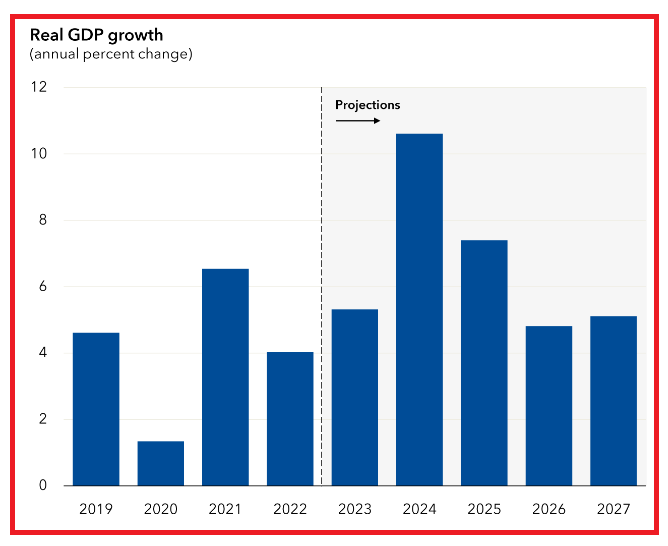
Source: IMF staff computation
current assessment of inflation in Senegal?
Inflation has become a significant concern in Senegal, with the rate reaching a multi-decade high of 9.7 percent in 2022, driven largely by the increase in food prices. As food prices account for almost half of the CPI basket in Senegal, inflation has been difficult to contain. The authorities have responded by implementing measures such as increasing fuel and electricity subsidies and raising public sector wages, however, public investments have been reduced to manage the fiscal deficit. While inflation has eased somewhat to around 9 percent, there is still a risk of an increase if commodity prices remain high. To address this challenge, steps need to be taken to reduce the fiscal deficit, streamline tax exemptions, phase out energy subsidies, and target social spending more effectively. By adopting these measures, the Senegalese authorities can improve debt sustainability and mitigate the impact of declining real incomes caused by high inflation.
Senegal and the International Monetary Fund have recently agreed to a new financing program amounting to US$1.5 billion over a period of 36 months.
The Extended Credit Facility/Extended Fund Facility (ECF/EFF) arrangement aims to support Senegal in pursuing its reform agenda with three main objectives. Firstly, it aims to reduce Senegal's debt vulnerabilities by embarking on a credible fiscal consolidation path through further revenue mobilization and phasing out energy subsidies. Secondly, the program aims to strengthen public sector governance and combat money laundering and the financing of terrorism. Lastly, it aims to foster a more inclusive and private sector-led growth, which will contribute to the achievement of Senegal's development goals. By achieving these objectives, the program seeks to support Senegal's economic growth and stability, as well as to improve the well-being and prosperity of its citizens.
Senegal's Climate Mitigation and Adaptation Strategy with IMF's Resilience and Sustainability Facility
Senegal has secured approval for the IMF's Resilience and Sustainability Facility. The disbursements under the 3-year arrangement amount to around US $324 million, or approximately 1 percent of GDP, which will support the mobilization of additional financing and support from development partners, as well as local resources, to cover the country's mitigation and adaptation needs, as outlined in its Nationally Determined Contribution. To meet these objectives, key reform measures under the RSF will focus on the gradual phasing out of untargeted electricity sector subsidies, adoption of an implementation plan for greener public transport, collection and dissemination of granular risk climate data, and the integration of climate change considerations into the budget process.
Senegal has made significant strides towards meeting its obligations under the Nationally Determined Contribution (NDC) with regard to climate actions. The NDC outlines the country's plans to mitigate and adapt to the effects of climate change between 2023 and 2030, with financing needs estimated at about 7 percent of GDP each year. In this regard, the recent disbursements under the RSF's three-year arrangement, totaling approximately 1 percent of GDP, or roughly US $324 million, are expected to catalyze additional funding from development partners such as the World Bank, the UNDP, the AfDB, and the EIB, in addition to domestic resources. The RSF's key reform measures aim to phase out untargeted subsidies in the electricity sector, adopt a greener public transport strategy, collect and disseminate granular, geo-tagged climate risk data, and integrate climate considerations into the budgeting process. By implementing these measures, Senegal will be better positioned to achieve its NDC targets and achieve a greener, more sustainable future.
Senegal recently signed a Just Energy Transition Partnership (JETP) agreement with G7 countries and the EU. How will this agreement help Senegal’s climate change agenda?
On June 22, Senegal signed a JETP loan agreement with G7 countries and the EU worth $2.7bn. Essentially, JETP agreements aim to bridge the gap between developed and developing nations in moving towards clean energy. South Africa, Indonesia, and Vietnam are the first three countries to have signed such an agreement. In the case of Senegal, this partnership aims to support the country in (i) developing a climate-resilient strategy for the energy sector, (ii) increasing the share of renewable energy, (iii) improving storage and grid stability, and (iv) creating sustainable jobs. This agreement demonstrates Senegal's strong commitment to accelerate the transition to clean energy, as embedded in the authorities’ NDC.
Recently, there have been widespread protests in the country. What effect might these have on planned reforms?
Senegal stands as a cornerstone of stability within the dynamic West African region. The nation's leadership has consistently showcased a steadfast dedication to enacting far-reaching reforms aimed at fostering growth and development. As we observe the unfolding political landscape, we earnestly urge all parties involved to seek avenues of peaceful resolution for any differences that may arise.
This commitment to peaceful dialogue and collaboration is not merely a call for stability but a vital cornerstone for Senegal to fully actualize its ambitious reform initiatives. The nation's reform agenda, with its potential to drive economic growth and enhance the well-being of its citizens, hinges on an environment of political harmony and constructive engagement.
In this context, the collective efforts of Senegal's stakeholders are instrumental. By choosing the path of peaceful conflict resolution, Senegal can continue to serve as a beacon of progress, inspiring other nations within the region and beyond. It is only through such unity and cooperation that Senegal can unlock its complete economic potential, thereby bringing prosperity and opportunities to its people.
In conclusion, we commend Senegal for its role as a stable force in West Africa and applaud its dedication to transformative reforms. The pursuit of peaceful dialogue and resolution remains paramount, as it not only ensures political stability but also paves the way for Senegal to achieve the lofty economic goals it has set forth.
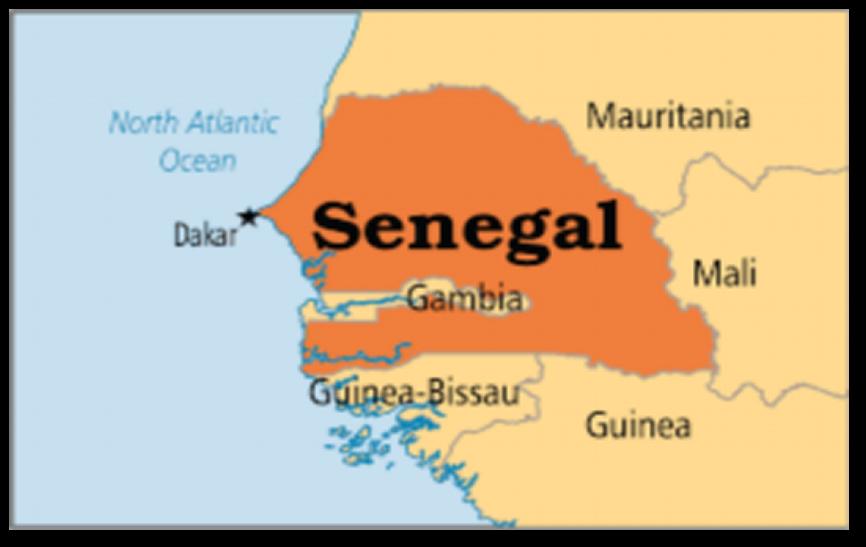
Source:https://apanews.net/2023/03/15/senegal-imf-predicts-5-percent-inflation-in-2023/
China's Role in Senegal's Thriving Oil and Gas Industry
China's presence in Senegal's burgeoning oil and gas sector has added a dimension of international significance to the country's development trajectory. As a major global player in energy markets and investment, China's involvement in Senegal's hydrocarbon endeavors carries implications for economic growth, infrastructure development, and geopolitical dynamics. This section explores the multifaceted role that China plays in Senegal's oil and gas industry.
Investment and Financing
China's voracious energy appetite and strategic interest in resource-rich regions have driven it to invest significantly in Senegal's oil and gas sector. Chinese state-owned enterprises (SOEs) and private companies have extended substantial financial backing to exploration and production activities, ensuring the necessary capital for the development of critical infrastructure, such as drilling rigs and pipelines.
Infrastructure Development
China's expertise in construction and infrastructure development has found a platform in Senegal's oil and gas industry. Chinese companies have been involved in building essential facilities, including processing plants and transportation infrastructure. These projects not only facilitate resource extraction but also foster local capacity building through knowledge transfer and training.
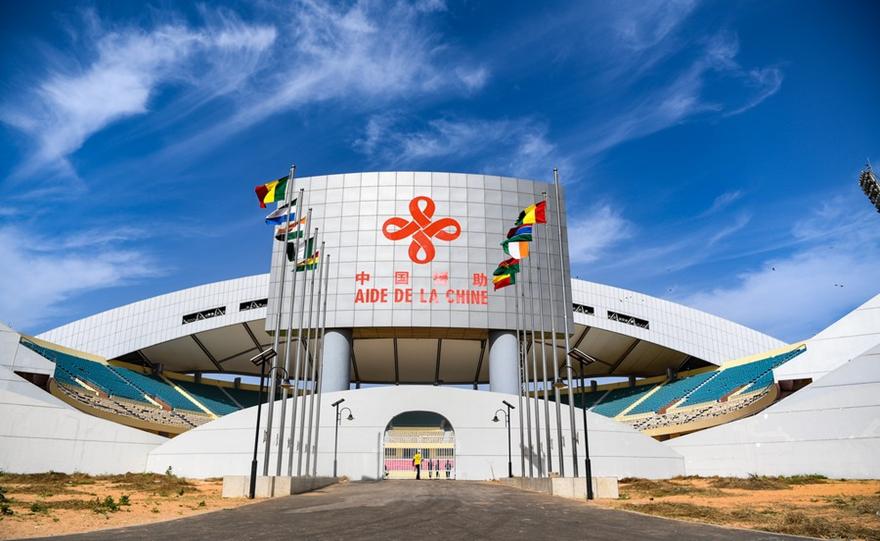
Photo taken on Nov. 21, 2021 shows the exterior view of the National Wrestling Arena in Dakar, Senegal. The arena, the first modern one in Africa, is the largest aid project China has carried out in Senegal. (Xinhua/Li Yan)
Diplomacy and Strategic Interests
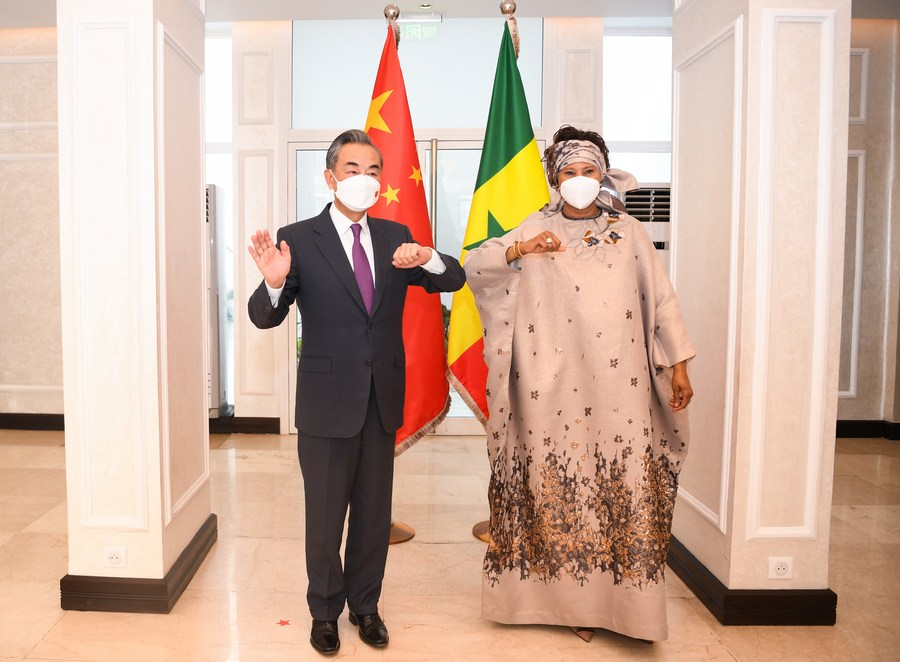
Chinese State Councilor and Foreign Minister Wang Yi (L) holds talks with Senegalese Foreign Minister Aissata Tall Sall in Dakar, Senegal, Nov. 28, 2021. (Xinhua/Li Yan)
China's engagement in Senegal's oil and gas sector is inherently tied to its broader diplomatic and strategic interests in Africa. Senegal's hydrocarbon resources represent a means to secure energy supply for China's rapidly growing economy. Moreover, China's involvement strengthens its diplomatic ties with African nations, aligning with its broader global economic and geopolitical ambitions.
Local Content and Skill Development
In line with its "Going Global" strategy, China often emphasizes collaboration with local communities. This extends to Senegal's oil and gas industry, where Chinese companies strive to enhance local content through employment and skill development initiatives. The transfer of technical expertise and training programs contributes to human capital development in Senegal.
Challenges and Concerns
However, China's involvement is not without challenges and concerns. Questions about environmental sustainability, transparency, and the equitable distribution of benefits have arisen. Ensuring responsible extraction practices, environmental safeguards, and the fair distribution of revenues will be essential to mitigate potential negative impacts.
Market Access and Energy Security
For China, engagement with Senegal's hydrocarbon sector extends beyond bilateral relations. Access to Senegal's energy resources aligns with China's quest for diversified energy sources and energy security. Senegal's contribution to China's global energy portfolio bolsters China's resilience against supply disruptions.
Future Implications
China's continued involvement in Senegal's oil and gas industry will likely have implications for the country's economic development, governance structures, and geopolitical relations. Senegal's ability to manage its partnership with China while safeguarding its national interests will be instrumental in defining the long-term impact of this collaboration.
In conclusion, China's role in Senegal's oil and gas industry underscores the intricate web of economic, political, and strategic interests that characterize international engagements in the energy sector. As Senegal navigates this relationship, it must ensure that its hydrocarbon endeavors contribute to sustainable development, responsible resource management, and equitable prosperity, aligning with its own long-term development aspirations.
Reference:
https://www.scirp.org/journal/paperinformation.aspx?paperid=72274
Sall, O. (2016). Chinese soft power in Africa: Case of Senegal. Open Journal of Social Sciences, 4(11), 133-142.
https://www.imf.org/en/News/Articles/2023/07/12/cf-senegals-growth-prospects-are-strong
http://www.news.cn/english/2021-11/29/c_1310341206.htm
https://apanews.net/2023/03/15/senegal-imf-predicts-5-percent-inflation-in-2023/
https://www.worldbank.org/en/country/senegal/publication/senegal-economic-update-2023-addressing-the-needs-of-vulnerable-groups-for-national-development
https://apanews.net/2023/03/15/senegal-imf-predicts-5-percent-inflation-in-2023/
https://www.trade.gov/country-commercial-guides/senegal-oil-gas
Niang, A. (2019). The Chinese Factor in Senegal: Changing Entrepreneurial Dynamics, and Socio-Economic Restructuring. In Chinese and African Entrepreneurs (pp. 170-193). Brill.
https://www.oilreviewafrica.com/exploration/exploration/senegals-oil-and-gas-projects-to-bring-new-era-of-economic-growth.
Siméon, N., Li, X., & Xiao, S. (2022). China's agricultural assistance efficiency to Africa: Two decades of Forum for China-Africa Cooperation creation. Journal of Agriculture and Food Research, 9, 100329.